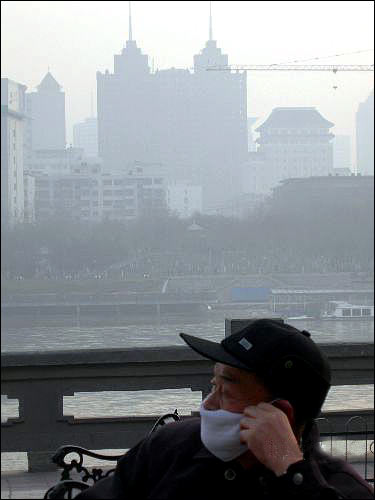| Home / Environment / News | Tools: Save | Print | E-mail | Most Read |
| Lanzhou to Walk off Pollution |
| Adjust font size: |
So serious is the air pollution in Lanzhou, capital of northwest China's Gansu Province, this winter that Mayor Zhang Jinliang has asked civil servants to walk to work on days when the pollution level is very high. The local environment protection administration will map out a contingency plan for such days when the city needs to be saved from more automobile and industrial emissions.
Despite the best efforts of the local government and its people to improve the environment, Lanzhou remains one of the 10 most polluted cities in the world. Smoke pours out of chimneys in Lanzhou. Pollution has combined with a cold front and dry weather conditions to aggravate already poor environmental conditions in the city. Gansu's capital sits in a valley, making the movement of wind very difficult. Slow wind speed, heavy vehicle emissions and a dry and dusty winter have worsened matters this year. To prevent the situation from deteriorating any further, the local government issued a notice on January 8 banning the demolition of urban structures from November to March. Lu Zhaowen, director of Pollution Control Section of Lanzhou Environment Protection Bureau, said on Tuesday: "Along with other measures, we suggested that civil servants walk to and from their offices on days when the pollution level is very high to reduce vehicle emission." Regional development expert Guan Lianji attributed the grave situation to three main factors: heavy industrial emissions, use of coal as the main source of fuel and special geographic and climatic conditions of the city. Frequent sandstorms, dry and dusty weather, and a lack of precipitation aggravated the situation last year, said Lanzhou Meteorological Center's chief forecaster Yang Jiancai. "Thirteen sandstorms hit the city last year, eight more than in 2005, and the precipitation level was 46 percent lower than in previous years. Also, the average annual temperature was 2 degrees Celsius higher than in previous years. All this and less cold air this winter have worsened air pollution," Yang said. The number of vehicles in Lanzhou reached 232,000 last year, 26 percent more than in 2005, increasing the volume of emissions. Added to that were widespread and large-scale demolitions in the urban area, Lu said. The local government started air pollution control projects way back in the 1980s. And in 2005, it implemented a pollution control plan, Project 123, to change the fuel used in buses, taxis and boilers. "We plan to make the buses and taxis shift from petrol or diesel and boilers from coal to natural gas, cleaner fuel, in one to three years, but the shortage of natural gas slowed down the plan," Lu said. Statistics show that the city needs about 2.2 million cubic meters of gas a day, but the average supply only mounts to 1.8 million cubic meters. To effectively and better control air pollution, the city took some serious and urgent steps at the end last year, Executive Vice-Mayor Wu Jide said. "They include plans to build a concentrated heating system for urban residential and commercial areas, building more gas stations, research on and promotion of clean coal technology and planting more trees to improve the environment," Wu was quoted as having told Gansu Daily. (China Daily February 15, 2007) |
| Tools: Save | Print | E-mail | Most Read |
 |
| Related Stories |
|
||||
